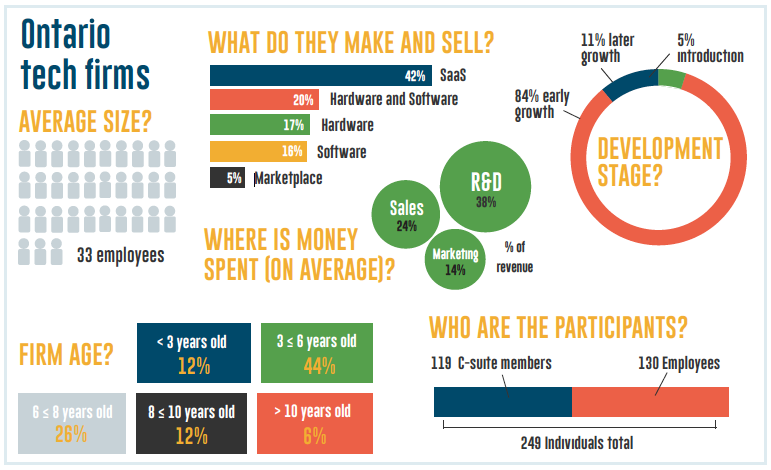We use cookies on this site to enhance your experience.
By selecting “Accept” and continuing to use this website, you consent to the use of cookies.
Search for academic programs, residence, tours and events and more.
Sept. 1, 2020
For Immediate Release
WATERLOO – A new study by researchers at Wilfrid Laurier University’s Lazaridis School of Business and Economics has found that if COVID-19 stay-at-home orders were lifted tomorrow, 75 per cent of Ontario technology firms surveyed would choose to have at least some employees return to the office. Just 18 per cent would want all of their employees to continue working fully remotely, while seven per cent of firms would end working-from-home arrangements all together.
“Given the early decisions by big players like Shopify to go fully remote, it’s interesting to see just a few months later that many companies favour more of a mix as they move forward,” said primary investigator Nicole Coviello, a professor of marketing and the Lazaridis Chair in International Entrepreneurship and Innovation. “As time goes on and leaders can better understand how their employees are feeling, they seem to be changing their minds.”
Both employees and executives cite work-life-home balance and lack of face-to-face interaction as two of the biggest challenges they are facing in their new working environments. For employees, there is also a sense of isolation. Even still, 80 per cent of C-suite members in the tech sector report that productivity is either stable or has increased since the COVID-19 pandemic began in March.
“Many of the companies in our sample offer a virtual product, so that makes it easier for them to be agile and shift their operations,” said Coviello. “But employees at firms who are hardware-based and need people to work on equipment in close proximity are struggling more.”
The findings are included in a new report called “Coping with COVID: Insights from Canadian Tech Firms,” which Coviello co-authored with fellow Laurier professors Sarah Wilner and Anne Domurath, along with Maria Rouziou, assistant professor of marketing at HEC Montreal. The standalone report is part of a broader two-year study funded by the Social Sciences and Humanities Research Council analyzing which business practices are tied to high performance.
The research team, which has been surveying a mixture of employees and executives at Ontario tech firms every six months, pivoted their focus to address pandemic-related challenges in their latest round of data collection.
“When COVID-19 hit, we reached out to our participants to see if they still had capacity to continue with the study,” said Coviello, who was recently inducted into the Academy of International Business. “What we heard is that they wanted to know how other firms were coping and what they were doing to address this new crisis, so we added pandemic-specific questions onto the core survey. We still tracked performance, but from a different angle.”
Economic performance seems to have remained relatively consistent between December 2019 and the latest round of data collection in June and July 2020. Though most executives reported that sales revenue is not meeting objectives, there is minimal difference in perceived performance levels over the last six months. Other results indicate that customer retention objectives are generally being met. Combined with the other data points in the survey, Coviello believes that this is generally good news.
“We know that some tech firms are struggling, but overall there seems to be a reasonably positive outlook for the sector,” she said.

Participants in the "Coping with COVID" study
As the pandemic lingers on, Coviello would advise C-suite members to pay attention to employee needs in order to maintain productivity and performance.
“There is overlap in the top three things that employees and management are struggling to adjust to in a virtual environment, but once we dig deeper, there are important differences to tease out between the two groups,” said Coviello. “Managers need to move beyond adapting to a home work environment and decisions at the firm-level. That was critical when COVID-19 hit, but our results suggest that now they need to spend more time focused on their people, managing workload and maintaining both morale and motivation. Those issues are very real in the eyes of employees and need to be attended to.”
From a research perspective, the COVID-19 pandemic has afforded a unique opportunity to examine the impacts of an economic downturn on businesses, and Coviello is working with three graduate students on the project. Rather than analyzing factors like the impact of new competitors or a departing CEO, these emerging researchers are able to study one of the worst global crises in history.
Ali Anwar, who is pursuing his PhD in Management (Marketing), has played a key role in all stages of the research process so far, from survey design to data collection and analysis. He is grateful for the experiential learning opportunities offered at the Lazaridis School of Business and Economics.
“Normally, PhD students get involved in research after a year or two, but I was lucky to get to do it right off the bat,” said Anwar. “I enjoy getting to engage directly with these companies and understand how industry people look at things rather than being exclusively engrossed in theoretical learning. This kind of exposure is difficult to get if you’re not involved in a project like this.”
Anwar, Coviello and their collaborators will conduct their final round of data collection in December, which will include follow-up questions on COVID-19 specific data points.
– 30 –
Media Contacts:
Nicole Coviello, Professor of Marketing
Lazaridis School of Business and Economics, Wilfrid Laurier University
Lori Chalmers Morrison, Director: Integrated Communications
External Relations, Wilfrid Laurier University